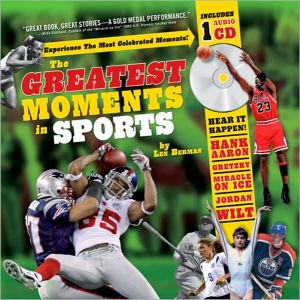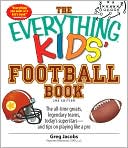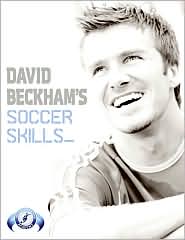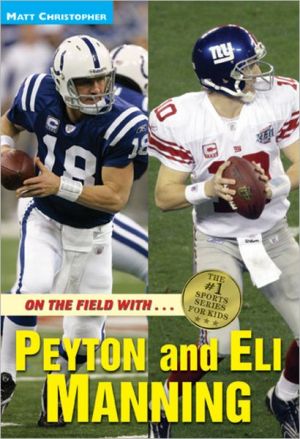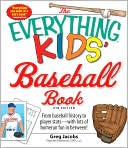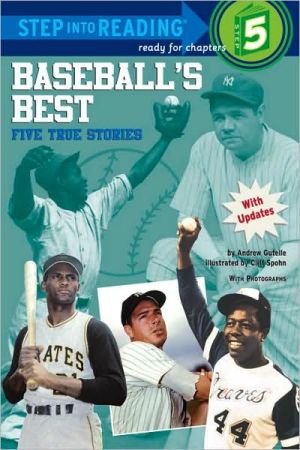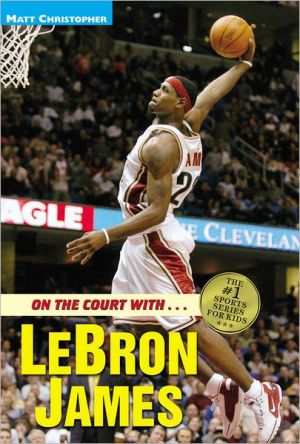The Greatest Moments in Sports
Experience all the action of the GREATEST MOMENTS IN SPORTS!\ If you had to pick the greatest thing in sports you'd ever seen, what would it be?\ Was it a miraculous comeback?\ An amazing catch?\ A game-winning buzzerbeater?\ Or something completely different?\ The best thing about sports is that you never know when a great moment is going to happen. And everyone has a different opinion about what the greatest moments are. Sportscaster Len Berman reveals his favorite moments in sports and...
Search in google:
A fun and memorable read for parents and children alike, The Greatest Moments in Sports serves as the perfect introduction to the world of sports.Booklist"Readers and browsers will enjoy paging through this compendium's stories and action-filled photos."
Excerpt from The Greatest Moments in Sports: Michael Phelps\ There is an old saying in sports that "records are made to be broken." But that's not always true. There are some records that may never be broken. One that comes to mind is the New York Yankees Joe DiMaggio. He got at least one base hit in 56 consecutive games in 1941. Maybe someday someone will come along and get a hit in 57 consecutive games, but it seems unlikely. Here's another one. In 1938, Cincinnati Reds pitcher Johnny Vander Meer pitched two consecutive no-hitters! To break his record, a Major League Baseball pitcher would have to throw three straight no-hit games. Trust me. That's not going to happen. At the 1972 Olympics in Munich, Germany, American swimmer Mark Spitz won seven gold medals. It was so unbelievable that most experts said it would never happen again. But it did in 2008.\ Michael Phelps was born in Baltimore in 1985. Things weren't so great for him as a kid. When he was nine, his parents got divorced. In addition to that, doctors said he had something called ADHD. He had trouble paying attention. He had so much extra energy, he couldn't sit still. At first, he had to take medication to help him concentrate. But he also tried something else: swimming! He was able to burn off all that extra energy in the pool. And I'd say he got pretty good at the sport. In fact, he was so good that at the age of 15, Michael was the youngest male in 68 years to make the U.S. Olympic swim team. At the 2000 Olympics in Sydney, Australia, he swam the 200-meter butterfly and finished in fifth place. Not bad for the teenager. But just wait!\ Along came the Athens, Greece, Olympics in 2004. He was now 19 years old and went from a fifth-place finish in one event in 2000 to swimming in eight events. Michael won six gold medals and two bronzes—the second-greatest swimming Olympics that anyone had ever had. Spitz's record was safe for now. But just wait!\ The Opening Ceremony for the 2008 Olympics in Beijing, China, began at eight minutes after eight in the evening on August 8, 2008. In other words, 8:08 on 8/8/08. Eight is a lucky number in China. It was also the number of finals that Michael, now 23, planned to swim. So, if he could somehow win them all, he'd win an astounding eight gold medals, one more than Spitz did in Munich.\ At the Olympics, you have to qualify before you can swim in the finals. This meant that if Michael were to swim in eight finals, he would actually have to swim 17 different races over a nine-day period against the best swimmers in the world. And it wasn't as if he was swimming eight races individually. Only five would be by himself. Three of the finals would be relays, meaning he had three teammates in each of those races. If any one of the other guys had a bad day, it would doom Michael and ruin his chance to make history. In short, Michael was trying to do the unthinkable.\ The first of Michael's 17 races came at the Water Cube (the swimming center in Beijing) the night after the Opening Ceremony. That evening, he would race in a qualifying heat for the 400-meter individual medley.\ Twenty-nine swimmers competed in four different heats to choose the eight best for the final. Michael not only swam the fastest time in his heat, but he was the fastest of all 29 trying to qualify. The eight swimmers who made it to the final didn't have long to wait.\ The first swimming final of the 2008 Olympics would be held in about 13 hours, at 8 a.m. on Sunday. This was the first chance for Michael to win the gold medal.\ Michael went into the race as the favorite. He was the world-record holder in this event. And he didn't disappoint. Michael not only won the race, but he also broke his own world record by more than a second. Gold medal number one. World record number one. But could he relax the rest of that day? No way. Later that night, he had to swim again in a qualifying heat for the 200-meter freestyle. He finished second in his heat, but he was fast enough to qualify for the semifinals. Now his day was done. One gold medal down; seven to go.\ The next day was even crazier. At ten o'clock in the morning, he swam in the semifinals of the 200-meter freestyle and qualified for the finals the next morning. And then about 80 minutes later, he had to get into the water for the final of the 4x100-meter freestyle. What sports fans around the world were about to see would be one of the most exciting moments of the entire Olympics.\ Remember, Michael had to depend on three teammates to accomplish his golden goals. Michael swam the first 100 meters. Not bad. He broke the American record, but his time was only good enough for second place to the Australians. Michael then stood on the pool deck and became the most famous cheerleader in swimming history.\ With just one length of the pool left, the Americans were trailing the French. And then the fourth American swimmer, Jason Lezak, went to work. With Michael cheering him on, Lezak swam the fastest 100 meters in relay history. It came down to the final stroke. Lezak and Alain Bernard of France both reached for the wall, and Lezak touched first by an incredible eight one-hundredths of a second! The United States had won! Two golds for Michael. Two world records. But this one would have been impossible without a little help from his friends.\ The next several days were a blur. Michael won gold medal after gold medal. He swam heats, finishing first or second every time. One day, he won two gold medals an hour apart and set world records in both! And that same night, he finished first in another heat. It was wild. Michael said: "I eat, sleep, and swim. That's all I do." We don't know much about the sleeping, but the other stuff was unbelievable. Along the way, he won his fourth gold medal, which, when added to his six from Athens, totaled 10! Nobody in Olympic history had ever won 10 gold medals.\ As dawn broke in Beijing on Saturday, August 16, 2008, here's what Michael had done so far: He had now swum 15 heats and finals. He had qualified in every heat, and in all six finals that he raced, he had won a gold medal and set a world record. He was still one gold medal shy of Spitz's record of seven. Nobody could have predicted what was about to happen.\ That morning was the final of the 100-meter butterfly (two lengths of the pool). Michael was trying to "tie history." Halfway through the race, Michael was in seventh place. Would this be the race he would finally lose? One by one, Michael started catching up to the other competitors when, at last, only a Serbian swimmer, Milorad Čavić, stood between Michael and gold. But Čavić wouldn't fade. The two of them splashed to the finish and then it was over.
Introduction [Track 1] Michael Phelps The Babe's Called Shot The '69 Miracle Mets [Track 2] Hank Beats the Babe [Track 3] The Great One [Track 4] A Perfect 10 Hitler's Olympics Arthur Ashe Battle of the Sexes The Greatest Game Ever Played The Greatest Play in Super Bowl History [Track 5] The Stanford Band Play [Track 6] The Youngest Master Clay Defeats Liston Wilt Scores 100 [Track 7] Michael Jordan's Shot [Track 8] Villanova vs. Georgetown Richard Petty U.S. Women's World Cup Soccer Big Red [Track 9] Jackie Robinson Roger Bannister Breaking the Curse of the Bambino The Immaculate Reception [Track 10] The Miracle on Ice [Track 11] Postscript [Track 12]About the Author
\ Booklist"Readers and browsers will enjoy paging through this compendium's stories and action-filled photos."\ \ \ \ \ School Library JournalGr 4–9—Forty years as a sportscaster gives Berman plenty of experience to choose the 25 greatest sports moments. His writing is lively, humorous, and informative—just right to sustain kids' (or adults') interest. Quality photos throughout are another plus. Each of the entries for the individuals chosen includes a brief biographical profile with birth date, birthplace, height, weight, and a fact about their accomplishments. Other boxes feature interesting trivia such as the price of a baseball ticket in the 1930s being a little more than a dollar. Another describes the amazing typical breakfast for swimmer Michael Phelps. An audio CD that includes many of the moments as they were broadcast live is part of the package. A "Listen to the Moment" icon appears in the text to cue readers. Another positive is that definitions of various terms (e.g., horse racing's Triple Crown) are in the text instead of in a separate glossary. Of course, there are a few minor details that aren't so great, too. Only two women: Nadia Comaneci (her perfect 10 performance in the 1976 Olympics) and Billy Jean King (her highly publicized match against Bobby Riggs in 1973) and one women's team (1999 U.S. Women's World Cup Soccer) are highlighted. Arthur Ashe's profile (his 1975 Wimbledon Championship) omits the cause of his early death and his fight against AIDS discrimination. Nonetheless, this is an excellent choice for anyone who is into sports.—Kate Kohlbeck, Randall School, Waukesha, WI\ \ \ Kirkus ReviewsPackaged with a magazine-style cover, this sports book is loaded with hype. Bold display types, bright colors and superlative enticements will lure readers to discover the stories behind such moments as "Muhammad Ali's Shocking Championship Upset." The author makes a strong push to diversity by including 24 different sports, baseball leading the way with five moments listed as "The Greatest." Only a few female athletes make the cut, yet there's room for 1973's fluff media event, "The Battle of the Sexes" between tennis star Billie Jean King and Bobby Riggs. Labeling any event as "The Greatest" opens the door for disagreement, and the overall relevancy will be a problem for today's teens. Will Babe Ruth always be included in "Greatest" conversations even 74 years after his last at-bat? The 1969 Mets may have been a miracle story 40 years ago, but detailing first baseman Marv Thornberry's feats feels trivial now. Due to a juvenile tone, the target audience seems to be lower middle school, but they may not care about Granddad's heroes. (Nonfiction. 12-14)\ \
